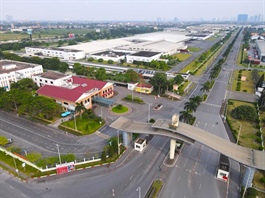SBV has not tightened credit into real estate: deputy governor
SBV has not tightened credit into real estate: deputy governor
The State Bank of Viet Nam (SBV) has not tightened credit into the real estate sector, Deputy Governor of the State Bank of Viet Nam Dao Minh Tu confirmed in a meeting with Vietnamese banks and property developers on Wednesday.

Tu dismissed the recent rumours from some associations that the central bank has been squeezing loans for this sector, saying that there has been no new document or statement issued on the matter.
"The SBV has put a grip on credit into some high-risk sectors and segments in the real estate, such as speculative investment and high-end segments with great value, which has the nature of a bubble, potentially threatening the system's safety," Tu said.
He said the real estate sector is one of the key industries that have largely contributed to the country's economic development.
However, the realty market has seen a growing supply and demand imbalance with an excess of high-end products, a lack of housing for middle- and low-income people, land fever in some localities and wrongdoings in the corporate bond market.
However, there is no tightening of credit in this sector, Tu reaffirmed.
The SBV's data shows credit balance for real estate businesses accounted for 21.2 per cent of the total credit outstanding of the whole economy worth VND25.8 quadrillion (roughly US$109 billion) as of December 31, 2022 – the five-year high and the highest proportion in all industries.
Loans focused on consumer demand and self-use with a proportion of 68.7 per cent of total outstanding loans, up 31.1 per cent over the past year, and credit to real estate business accounted for 31.3 per cent, up 11.5 per cent.
By segment, credit balance for housing needs accounts for 62.2 per cent, land use rights 20.7 per cent, industrial parks and export processing zones 2.7 per cent, social housing 0.7 per cent and other fields 13.7 per cent.
"Therefore, it can be seen that credit institutions are still providing credit to the real estate sector with high growth and large outstanding loans. Feasible projects and loan plans are still provided capital following regulations," said Ha Thu Giang, director of SBV's Department of Credit for Economic Sectors.
Giang said there is no separate 'room' for the real estate, as the credit limit for the whole system is set to suit inflation control, and there will be no shortage of credit at the beginning of the year.
Proposals of property developers
At the meeting, property businesses also raised the difficulties and problems of the real estate market, focusing on legal issues.
According to Le Hoang Chau, chairman of the HCM City Real Estate Association, 'legal problems' account for 70 per cent of the difficulties of real estate businesses in accessing credit loans.
Next is the risk of private corporate bonds becoming 'bad debt' or credit loans' turning into bad debt groups'.
Chau explained this happens when a loan which is about to be due that, if not extended, will be classified as 'bad' debts, or businesses with overdue credit loans may be 'jumped' into a group of 'worse' debt. In addition, homebuyers now find it difficult to get credit.
Meanwhile, Pham Thieu Hoa, chairman of Vinhomes, proposed the SBV allow banks to finance purchasing, selling, depositing, and transferring contributed capital and shares in project investment companies and M&A activities.
At the same time, Hoa said that lending rates need to be adjusted in parallel with maintaining the collateral ratio as conventional loans for projects with a fully legal basis.
In addition, it is necessary to add specific mechanisms and policies for large investors and major projects with full legal stands to avoid the situation of 'levelling'.
Le Trong Khuong, vice chairman of Hung Thinh Group and general director of Hung Thinh Land, also said that raising capital from bond issuance is an excellent source of money for businesses. However, at present, this channel is at an impasse.
To solve this bottleneck, he proposed that the SBV expand the 'credit room' so businesses can access more capital for business and investment.
According to Khuong, interest rates currently stand at a very high level, affecting the price of products sold in the market. He hopes SBV and commercial banks may devise plans to push it down to support businesses to create affordable products for people.
In the future, to tackle difficulties and obstacles for real estate businesses and individuals when accessing credit, Tu said the SBV would continue to operate monetary policies proactively and flexibly, in line with fiscal policy and other macroeconomic policies, to support the economy, including the real estate sector.
The monetary authority will guide banks to increase credit securely and efficiently, providing economic capital and focusing on viable loan plans with good sales and payment ability, particularly in the real estate sector.





















